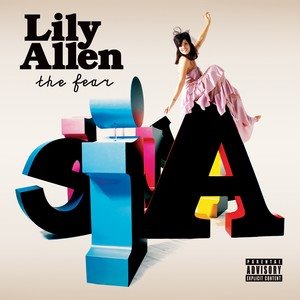June 05, 2009
Being taken over by the fear
 |  |
Two tremendous posts by ZoneStyxTravelcard and the resurgent Impostume, which demand some sort of response.
First off, Zone: he is absolutely right that the dominant emotion in mainstream media, cramped by shrinking word-counts, harrassed by demographics, worried that attention might wander, is fear. It's fear - unspoken but ubiquitous - that enforces the cheery-cynical tone that has been so much a part of the background muzak of the nu-50s. And Zone is right about the Lily Allen single, which sounds like everything St Etienne sought to achieve, but never quite managed. Fear was practically palpable in/ behind Allen's television series, which - with its YouTube tie-ins, its wooden flailings at 'interactivity' - summed up everything wretched about this decade's culture: the drab hedonic conservatism, the perpetually perky unpopular populism, so desperate to be liked by everyone that it appeals to no-one. "The Fear" gives voice to the ineradicable but disavowed existential anxiety that hangs like a pall of forbidden cigarette smoke behind all the dead parties and PR pseudo-events of 00s CeleBritain, still listlessly persisting even though the Weimar/ boom background has fallen away. In its own way "The Fear" is as bleak as "Smells Like Teen Spirit". "Bubbelgum nihilism" was the phrase Simon used of Dizzee's "Bonkers", and that captures something of "The Fear"'s poise and despair, but the exisential predicament that "The Fear" articulates is ultimately more reminiscent of the Boy In Da Corner Dizzee. Like much of Boy In Da Corner, "The Fear" is about a youth reflexive impotence that it is itself paralysed by ("I am a weapon of massive consumption/ it's not my fault/ it's how I'm programmed to function"). All Allen can do is point to her own inertia and complicity but awareness can only reinforce the very condition she is talking about - it's Nina's "one-dimensional woman" morosely looking into the mirror ("I'll take off my clothes and it will be shameless/ cos everyone knows that's how you become famous"). The verses are unsure whether they want to be satire or not, unsure whether they want to mock consumer-nihilism or celebrate it , unsure because - after all - what's the alternative, where can all this mocked from? ("It's all about fast cars/ and cussing each other"- capitalist realism satirised and exemplified.) Celebrity culture and its critique are coterminous; the jeremiads about its superficiality as cliched and empty as the culture itself, both appearing on the same pages of LondonLite. Only the negative capability of the choruses, only the admission of The Fear, breaks out of this circuit.
(Just briefly on the SY points: I brought up Swans not to compare their whole career with that of Starbucks Youth, but simply to refute the idea that No Wave was some dead-end, entailing retreat. Swans' records up to 85 emphatically demonstrated that wasn't the case. As for the Starbucks question: the claim that we shouldn't accept the 'individual responsibility' foisted upon us by corporations is surely not equivalent to the claim that we are absolved of responsibility for the way in which we shore up corporations by consuming their products; it's precisely this impasse which "The Fear" examines/ exemplifies, and which we have to think beyond.)
As for Carl's satirical remarks - I refuse to take these as anything other than a compliment, not even backhanded. Really, they are about theory's power, not to generate culture, but to elucidate and intensify it. What's interesting - and this has a direct bearing on some of the disputes about abstraction and the HCC to which I will return in a post that's been germinating ever since the UEL event - is the way in which Burial's music conducted affects and images so powerfully, so lucidly, without the mediation of the (facialised, biographical) individual or its self-understandings. (How different is Burial's abstract art - so painterly, so precise in the images it produced - to so much of what appears in galleries, with its overthought, overconscious, nulanguage meta-rationales, while 'the work' induces no ideas, no affects, at all.)
My first post about Burial was based on nothing more than a CDR, Kode9's press release and obsessive listening, mostly done while walking the South London streets near to where Carl himself lives. Walking and listening, listening and walking, (music and walking, my psychotropics: walking is psychedelic, as we said at the Gasworks londonunderlondon event), not being able to listen to anything else, not being able to settle until I'd written about it. (Contra the boring accusations - not made by Carl needless to say - that I write about music from a dry and dessicated perspective, this kind of method writing is the approach that I generally try to adopt; sometimes, as in the case of Burial, there is no need to try, it was a matter of being possessed, taken over by the music.) As I think I said in that first post, Burial's was a music that I'd dreamt of; or so it seemed: it immediately struck me as something familar. Burial's music certainly felt like it came from the same city as londonunderlondon - and not because of anything so crassly causal as influence, but because they'd both reached a Real of London. Often, the signature of the Real in art is the sense that a landscape, a terrain, has opened up that you feel you can move through - either literally or abstractly, sometimes both. ... And no-one was more surprised than me that Burial liked M R James. I literally could not have made that up, (nor would have done, surely, if I actually was trying to run a scam).
Posted by mark at June 5, 2009 08:09 PM | TrackBack